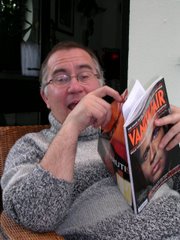The following essay is adapted from Clive James' Cultural Amnesia, a re-examination of intellectuals, artists, and thinkers who helped shape the 20th century. Over the coming weeks, Slate will run an exclusive selection of these essays, going roughly from A to Z, abbreviated for these pages.
You have everything that I lack. You are forging the spiritual tools for the renewal of Germany. I am nothing but a drum and a master of ceremonies. Let's cooperate!—Adolf Hitler at the Juni-Klub, spring 1922, as quoted in Jean Pierre Faye's Langages totalitaires.Adolf HitlerAdolf Hitler (1889–1945) should need no introduction. Statistics suggest, however, that a large proportion of young people now emerging from the educational systems of the Western democracies either don't know who he was or have only a shaky idea of what he did. One of the drawbacks of liberal democracy is thus revealed: Included among its freedoms is the freedom to forget what once threatened its existence. Granted the uncontested opportunity to do so, Hitler would have devoted himself to eliminating every trace of free expression that came within his reach. The awkward question remains of whether, on his part, this propensity precluded any real interest in the humanities. The awkward answer must be that it didn't.
Though it is tempting to think of him as illiterate, Hitler could quote Schopenhauer from memory. His love of music was passionate, to the point where some believed that his admiration for Wagner was a sufficient reason in itself for dismissing that composer from musical history. Hitler the would-be painter never lost interest in the plastic arts. His projected art gallery in his home town of Linz was one of his most dearly cherished dreams for Nazi Europe after the inevitable victory. Above all, Hitler was moved by architecture, which brings us to the central point, because he wasn't just moved by it, he was mad about it. He had no sense of proportion in any of his ostensibly civilized enthusiasms. His interests lacked the human element, so they could never have amounted to a true humanism. But though his connection with the civilized traditions was parodic at best and neurotic always, there was still a connection: In that respect, he stands above Stalin and Mao and should therefore, by the scholar, be handled with even greater caution, because he is far more poisonous.
Many of his more cultivated victims used their learned resources to deny that Hitler had a mental existence. Some of the last aphorisms written by the great Robert Musil were devoted to summarizing the pathogenic nature of Hitler. Beautifully crafted statements, they had no effect on Hitler whatsoever. The finest minds in Europe devoted their best efforts to proving that their mortal enemy had no mind at all. But nothing they said was of any avail. Hitler could be defeated only by armed might: i.e., on his own terms. Whole libraries written to his detriment didn't add up to the effect of a single Russian artillery shell. This ugly fact should be kept in view when we catch ourselves nursing the comforting illusion that there is a natural order to which politics would revert if all contests of belief could be eliminated. There is such a natural order, but it is not benevolent.
Books about Hitler are without number, but after more than 60 years, the first one to read is still Alan Bullock's Hitler: A Study in Tyranny. Familiarity with the events that it recounts should be regarded as an essential prerequisite to the study not just of modern politics but of the whole history of the arts, since its hideously gifted subject first demonstrated that a sufficient concentration of violence could neutralize any amount of culture no matter how widely diffused. It is not possible to be serious about the humanities unless it is admitted that the pacifism widely favored among educated people before World War II very nearly handed a single man, himself something other than a simple Philistine, the means to bring civilization to an end.
Respectably situated in Berlin's Motzstrasse, to the south of the Tiergarten, the Juni-Klub, or June Club (the name breathed defiance at the Treaty of Versailles), was a '20s talking shop for right-wing intellectuals concerned with revolutionary conservatism. The consciously oxymoronic idea of revolutionary conservatism had almost as many forms as it had advocates, who found it easy to mistake their dialectical hubbub for the clanging forge of a new order. Of the 150 members, 30 were present on the afternoon Hitler dropped in. They thought he had come to hear what they had to say, and they found out that he had no intention of listening to any voice but his own. Their scholarly qualifications counted for nothing. Best qualified of all was Arthur Moeller van den Bruck. Before World War I, Moeller had been a translator of Baudelaire, Defoe, De Quincey, and the complete poetry of Edgar Allan Poe, and had written essays on Nietzsche, Strindberg, and others. He knew Paris well and spent time also in London, Sicily, Venice, the Baltic countries, and Russia. For cultivation he was up there with Ernst Jünger, one of Germany's most gifted modern prose writers and likewise a revolutionary conservative.
How Hitler gained power. - By Clive James - Slate Magazine


1 comment:
Good words.
Post a Comment